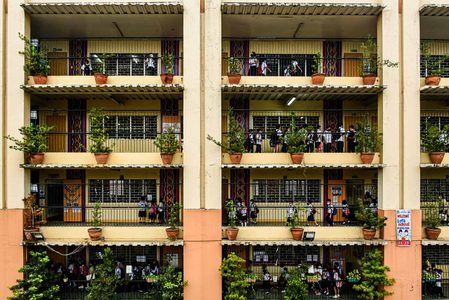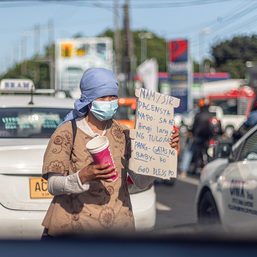SUMMARY
This is AI generated summarization, which may have errors. For context, always refer to the full article.
![[OPINION] Why are salaries of private school teachers so low, and what should be done?](https://www.rappler.com/tachyon/2022/09/salaries-private-school-september-20-2022.jpg)
The Department of Education (DepEd) has recognized a big disparity in teachers’ salaries between private educational institutions and public schools. So far, DepEd has refused pay increases for public school teachers but promised to look for ways to improve their non-wage benefits. DepEd fears that increasing their salaries would encourage private school teachers to migrate to public schools, which may trigger the closure of more private schools.
But teachers’ migration to public schools has been going on for many years. Among others, they transfer to public schools for better salaries and job security. Thus, improving non-basic wage benefits of public school teachers, sans salary increase, will not arrest the exodus of private school teachers.
In public schools, for as long as there is an existing regular item position, a duly licensed teacher qualifies for regularization immediately. Note that workers in the private sector typically need only six months to become regular employees; not so for private school teachers. They must obtain a license and three years of continuous and satisfactory full-time service. For teachers to acquire tenure in private higher educational institutions, this typically requires a Master’s degree plus three years or six consecutive semesters of satisfactory full-time service. Universities and colleges issue teaching appointments every semester; thus, non-tenured teachers are technically assured only of one semester of work unless reappointed. Some institutions do not give teachers a full-time load. Ergo, many of them do not acquire tenure even after three years of teaching. And many receive only 10 months of paid work (two semesters) due to limited course offerings and fewer enrollees during the summer term.
I came across higher education teachers whose graduate and post-graduate degrees were obtained from prestigious universities here and abroad. They are highly skilled in teaching and research. But they are moving to state universities not only for better compensation but for better retirement benefits. And I am also acquainted with a teacher employed in a thriving private university. She has the required graduate degree in science but despite teaching full-time for 25 years, she receives barely a minimum wage salary.
I do not deny that some private schools do pay their teachers well. These teachers receive monthly salaries equivalent to almost a year of wages for an ordinary private school teacher. But they are outliers in the vast ocean of low-salaried teachers.
So why have the salaries of most private school teachers remained low compared to public school teachers?
The culprit may lie in a provision tucked in Republic Act (RA) 6728, popularly known as the GASTPE Act. The title of the law says that it is an Act that provides government assistance to students and teachers in private education. Specifically, Section 5, paragraph 2 of this law requires that 70% of the tuition fee increase (TFI) shall go to the payment of salaries, wages, allowances, and other benefits of teaching and non-teaching personnel except administrators who are principal stockholders of the school. Further, the provision stipulates that 20% of the TFI shall go to the school’s capital expenditure, such as upgrading buildings and facilities, and operating costs. Since 1989 when President Aquino signed the GASTPE Act, educational agencies have issued memoranda to include the manner of consultation with all stakeholders and how schools shall distribute the mandatory TFI share for school employees before any application for a tuition hike is granted.
This law claims to recognize the complementary role of public and private educational institutions in delivering quality education. But after over 30 years of implementation, the law designed to assist teachers in private education has left them in the cold. Through the years, the salaries and benefits of teachers responsible for delivering quality teaching and learning in this sector have eroded and have lagged behind their public counterparts.
Private schools have often used the upgrade of teachers’ salaries and benefits to justify the call for an increase in school fees. But unknown to many, Section 5, paragraph 2 distinguishes tuition from miscellaneous and other fees. The mandatory 70% TFI share for school personnel is limited to increases in tuition. It excludes increases in miscellaneous and other fees. Thus, in many instances, a raise in tuition ends up with a token increase in tuition and more increases in miscellaneous and other fees. Or the increase will focus exclusively on the latter. The perennial complaints of students and parents about the unregulated rise of miscellaneous and other fees are well-known.
Section 5, paragraph 2 of the GASTPE Act is an amendment of Section 3, paragraph (a) of the defunct Presidential Decree 451, s. 1974. The latter authorizes the Secretary of Education and Culture to regulate the imposition of tuition and other school fees. Admittedly, Section 3 paragraph (a) of the presidential decree only provides that 60% of the TFI goes to the salaries and wages of school personnel. Still, it guarantees a share of school personnel to any fee increase — tuition, miscellaneous, and other fees, unlike Sec. 5 par. 2 that limits the TFI share of personnel to tuition only. PD 451 also provides that the 60% TFI share solely covers the upgrade of salaries of school personnel. Thus, if this provision had not been amended, private school teachers’ wages would not have been left behind. This Marcosian decree proved to be more prescient. But the increase from 60% to 70% of the mandatory TFI share of school personnel enshrined in the GASTPE Act proved to be a red herring after more than 30 years of implementation.
The GASTPE Act is not also clear on what constitutes a tuition fee increase. Even if the school charges a tuition fee higher than what it levied to the incoming students of the previous year, it is not treated as a tuition increase when the school collects a new fee from new students (first-year students). Thus, school personnel have no share in the revenues. Consequently, many schools will raise fees for incoming students without increasing tuition at the higher levels.
Further, the various interpretations of distributing the mandatory 70% TFI share to school employees do not favor them. For one, in 2001, in Cebu Institute of Medicine et al. v. Cebu Institute of Medicine Employees Union, the Supreme Court ruled that the employers’ contribution to SSS, Medicare, and Pag-IBIG premiums were chargeable against the mandatory 70% TFI share. As it is now, depending on the discretion and fertile imagination of school management, they can use the mandatory increment share to defray the cost of so many things. It could cover the costs of faculty Christmas parties, field trips of teachers, student scholarships, and even the incurred expenses on activities connected with the institution’s corporate social responsibility (CSR). Teachers, in most cases, are left in the dark about how schools utilize their mandatory share in the tuition increment.
Sadly, there is very little public attention on this issue. Unlike public school teachers, the more than 500,000 private schools’ academic and non-academic employees, especially teachers, have no unions to represent them. They are mostly unaware of the provision in the GASTPE Act that impacts their income. Even the few labor unions established in some private schools find it difficult to obtain details of TFI utilization from school management; how much more for the vast majority of non-unionized employees in private schools?
Government policies that have existed since 1989 are not helpful as well. They do not require schools to provide all the stakeholders with a detailed accounting of how schools utilize the mandatory TFI share. Government agencies only require consultation among stakeholders and a statement under oath from the school head that the school is complying with all the mandatory requirements concerning the incremental proceeds. Obviously, the devil is in the details. But when labor unions press for more detailed utilization of the 70% TFI share during collective bargaining negotiations, school administrators would refuse and proffer the Data Privacy Act of 2012 (RA 10173) to justify their refusal.
Thus, from the preceding, in many ways, the inability of private schools to keep their teachers is self-inflicted. And increasing the wages of public school teachers may drive private school institutions to provide competitive salaries and benefits for their teachers.
So, what to do?
First, the government must address the low pay of private school teachers directly. Section 5, paragraph 2 of the GASTPE Act needs serious review. Reinstating some of the provisions of PD 451 is worthy of serious consideration.
Second, the Department of Labor and Employment (DOLE) must ensure that private schools comply with the requirement of Section 5, paragraph 2 — pending its amendment — including submission of a detailed utilization of the TFI share in determining the institutions’ compliance with labor standards. I premised this proposal on the right of workers to transparency in the information that seriously affects their economic well-being. I also base this proposal on social justice — those who have less in life should have more in law.
Third, for more nuanced policy-making, the government must recognize the difference between two types of private schools, the profit and the non-profit. The nature and purpose of profit and non-profit schools differ (I am not ruling out that non-profit schools make some profit!). But the regulation concerning collection, increase, and utilization of fees ignores the difference. Policy-wise it is worth looking at how these distinct types of private schools utilize school fees to improve the working conditions of school personnel. Furthermore, big organizations of private schools have repeatedly clamored for state assistance. Indeed, private schools deserve state assistance. They help government provide education which is a public good. But the government must anchor such aid on the demonstrated willingness of the schools to maintain quality education. Undoubtedly, teachers’ working conditions (compensation, tenure, teaching load, and teachers’ development, including respect for freedom of associations) have quality implications. So how do private schools respond to these work-related quality imperatives? The proof of the pudding is in the eating.
Lastly, sound research and evidence-based policies are vital to effect genuine and successful educational reform. Given the disappointments and broken promises of the K-12 program, President BBM’s government by this time would have realized that pandering to vested interests or political calculations is harmful to the quality of education in the country. Looking back, PNoy’s government promised more revenues for private schools by expanding the services of private education institutions and non-DepED schools under the principle of public-private partnerships. Thus, many embraced the program and shut their eyes to the well-founded criticisms against its full implementation, such as doubts about the soundness and effectiveness of the curriculum, unprepared teachers, lack of school facilities, and wastage of government resources. Politically, given that President Benigno Aquino considered the K-12 program as one of his important legacies, his government implemented the ill-prepared program despite broad public opposition to the measure.
The demand for sound research and evidence-based educational policies should hopefully inspire educational leaders and policymakers to undertake comprehensive studies that will closely examine the political economy of private educational institutions in the context of the country’s entire educational system. The same should also make them more cautious and critical of claims (e.g., increasing salaries of public school teachers leads to more closure of private schools) that merely serve as boogeymen to keep the government from establishing policies and regulations that promote better working conditions for ALL teachers. – Rappler.com
Rene Luis Tadle is a faculty member of the Philosophy Department of the Faculty of Arts and Letters, University of Santo Tomas and a lead convener of the Council of Teachers and Staff of Colleges and Universities (CoTeSCUP). Currently, he is a member of the Board of the Technical Education and Skills Development Authority (TESDA), representing the labor sector.
Add a comment
How does this make you feel?

![[OPINION] More than celebrating our teachers, we should know their struggles](https://www.rappler.com/tachyon/2021/10/ispeak-sq-2.jpg?fit=449%2C449)


![[OPINYON] Tungkol sa naging viral na social media conjecture](https://www.rappler.com/tachyon/2024/07/thought-leaders-conjecture-07262024.jpg?resize=257%2C257&crop_strategy=attention)

![[EDITORIAL] Apat na taon na lang Ginoong Marcos, ‘di na puwede ang papetiks-petiks](https://www.rappler.com/tachyon/2024/07/animated-bongbong-marcos-2024-sona-day-carousel.jpg?resize=257%2C257&crop=280px%2C0px%2C720px%2C720px)






![[OPINION] Unpaid care work by women is a public concern](https://www.rappler.com/tachyon/2024/07/20240725-unpaid-care-work-public-concern.jpg?resize=257%2C257&crop_strategy=attention)




There are no comments yet. Add your comment to start the conversation.